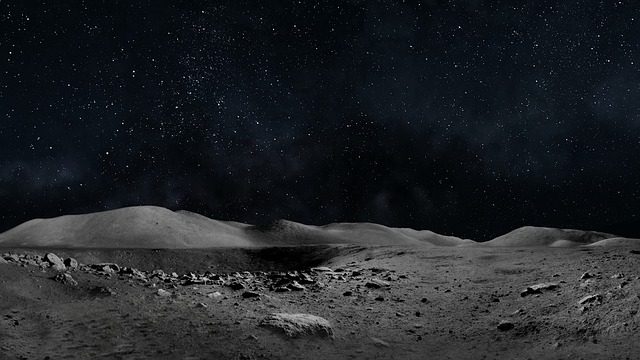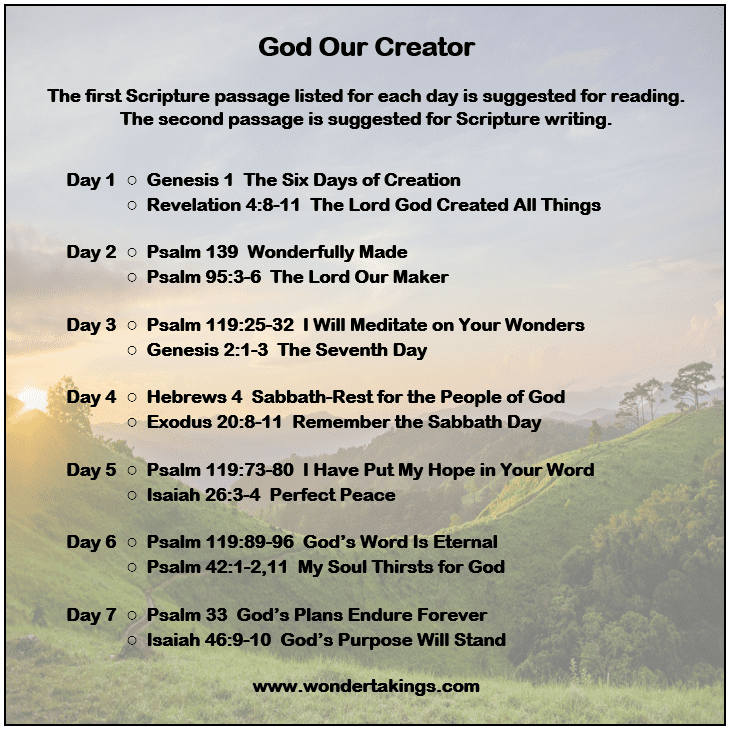6 Days = 13.8 Billion Years?
“God saw all that he had made, and it was very good. And there was evening, and there was morning — the sixth day. Thus the heavens and the earth were completed in all their vast array.”
Genesis 1:31-2:1 NIV
“In 2012, WMAP estimated the age of the universe to be 13.772 billion years, with an uncertainty of 59 million years. In 2013, Planck measured the age of the universe at 13.82 billion years.”
Nola Taylor Redd, “How Old Is the Universe?” on space.com
The Bible clearly states in Genesis that the universe was made in six days, but scientific data estimates the age of the universe to be about 13.8 billion years. How do we reconcile these vastly different time frames? We’ll explore some theories in this post. However, as we do, it’s important to keep in mind the main point Genesis 1 makes: God did it. He created all that exists. In The Portable Seminary A. Berkeley Mickelsen says, “What we know about the creation of the world is only what God has chosen to disclose. . . . With so little detail given no one should pretend to have a full picture.”
Douglas Jacoby in Genesis, Science & History discusses five major theories in interpreting the “days” of Genesis. We will look briefly at each of these, and we’ll also examine an intriguing viewpoint by Gerald L. Schroeder, who believes that the time from the Big Bang until the appearance of mankind was simultaneously six days and billions of years. Each of these theories is accepted by God-fearing people who believe in the Bible, and I really enjoy examining their different perspectives. While it’s thought-provoking to consider different interpretations, I don’t believe it’s a big deal if we as Christians don’t all agree. As Dr. Jacoby says, “The precise nature of the six days of creation is far from being an issue of salvation.” I admit I have not done extensive research on any of these theories, so this will be just a brief overview based on some of my reading. My hope is that this discussion will give you some food for thought and a greater appreciation for God’s amazing creation.

The Literal Theory
The literal theory states that the six days in Genesis 1 were six literal 24-hour days. The literal theory is a part of young earth creationism which claims the age of the earth is around 6,000 years. Dr. Jacoby gives several reasons to reject this interpretation, including the scientifically established age of the earth, which is around four billion years. While God certainly could have created everything instantly, His usual way of working is through a process: there were many cosmic and evolutionary processes involved in creating just the right environment for humankind. Dr. Jacoby states, “Once we begin to realize there are scientific — and even theological — reasons for the earth to be as old as it is, the notion that ours is a very, very old world ceases to upset our religious predilections.” He also points out that the literal view was not the dominant interpretation held by the early “church fathers” nor by Christian thinkers throughout the centuries.
The Gap Theory
This theory states that there is a gap of time between Genesis 1:1 and 1:2. During this time the earth was destroyed, and it took six 24-hour days to re-create the earth. This theory became popular in the nineteenth century as a way to reconcile new scientific discoveries with the Bible. Proponents of the gap theory cite a possible alternate translation of Genesis 1:2 as “Now the earth became formless and empty . . .”. Dr. Jacoby points out, however, that this translation is hard to justify. He also states that there is no biblical evidence to support the idea that the fall of Satan and his demons ruined the original creation, which is something advocates of this theory believe.
Revelatory Day Theory
In this theory, the creation account was revealed by God to Moses over the course of seven days. On each day Moses “saw” a different aspect of creation. Thus, the “days” in Genesis 1 refer to the literal amount of time it took to reveal each stage of creation, not the actual length of time to accomplish creation itself. In this way, the revelatory day theory resolves the time conflict between the biblical creation account and the scientifically-proven age of the earth. Dr. Jacoby explains, “This is another nineteenth century stab at reconciling Genesis with the antiquity of the earth, and it has few adherents.”
Day-Age Theory
The day-age theory, which is a very popular viewpoint among Bible supporters, associates each “day” in Genesis with a geologic age. This theory highlights the correlation between the Genesis account and modern geology: increasing order, conditions for life preceding existence of life, vegetable life preceding animal life, simpler forms preceding complex forms, and humankind as the apex of creation. In this way it accounts for the ancient earth. Dr. Jacoby, who declares that he was a proponent of this theory for many years, now states: “Yet the Day-Age Theory seems to concede too much, while lacking any biblical support. It would never have been devised had the conflict between Darwinians and churchmen not happened.”
Literary Theory
The view that Dr. Jacoby favors is the literary theory. He describes it as follows: “In this view, the days are not meant to be taken literally. Rather, they are a literary device for communicating the truth about creation. The original readers of Genesis, sharing the author’s culture, understood exactly what he meant.” In this theory the descriptions of the days are intended to convey theological, rather than chronological, facts: God is a God of order, and He created the world carefully in preparation for human habitation. This theory makes no scientific claims about the length of time involved for creation. Rather, it takes into account the historical and literary context of the book of Genesis. Dr. Jacoby asserts, “In attempting to interpret Genesis 1 and 2 ‘scientifically,’ many men and women miss the richness of the descriptions, symbolism, numerology, poetry and careful construction of the account.”
According to Dr. Jacoby, the literary theory is the only one which considers all of the following aspects of the Genesis account. The biblical narrative, in describing a loving God creating a world just for us, stands apart from the other creation stories of the time. Also, many biblical scholars have studied the text of Genesis and have discovered that chapter 1 is carefully constructed to include symbolic numbers, especially three, seven, and ten. The literary theory includes the doctrine of the Sabbath, which would have been especially significant for the Israelites at that time. God didn’t need to “rest” on the seventh day. The termination of creation was a break or rest from our perspective, setting an example for us to follow.
Different Simultaneous Time Periods Theory
Gerald L. Schroeder, in his book Genesis and the Big Bang, makes a fascinating claim about the biblical account of creation versus the scientific age of the universe. He points out that archaeological evidence confirms the biblical calendar for the “post-Adam period.” Therefore, the six days preceding Adam should also coincide with scientific findings. At the time of his writing (1990), the age of the universe was estimated to be around 15 billion years, which is not too far off from the 13.8-billion-year estimate we have today. He says:
“The Bible gives God six days to form mankind from the material produced at the creation. Current cosmology claims, it even proves, that nature took some 15 billion years to accomplish the same thing. Which understanding is correct? Both are. Literally. With no allegorical modifications of these two simultaneous, yet different, time periods. It is unequivocal. Six 24-hour days elapsed between ‘the beginning,’ that speck of time at the start of the Big Bang, and the appearance of mankind, and simultaneously, it took some 15 billion, 365-day years to get from ‘the beginning,’ or the Big Bang as astrophysicists call it, to mankind.”
Gerald L. Schroeder, Genesis and the Big Bang
He bases his argument on Einstein’s theory of relativity. I don’t feel qualified to try to explain the physics concepts involved, so I have included a video on time dilation from Science ABC in case you are interested in how this works. If not, feel free to skip it. Basically, we just need to know that according to Einstein’s general theory of relativity, gravity causes time dilation. In other words, time is relative: time slows down in greater gravity, which means a clock on Earth runs more slowly than a clock in outer space.
“Einstein demonstrated that when a single event is viewed from two frames of reference, a thousand or even a billion years in one can indeed pass for days in the other.”
Gerald L. Schroeder, Genesis and the Big Bang
According to Dr. Schroeder’s theory, what was a few days for God was a few billion years from our perspective. This means both time descriptions are equally valid. It all depends on your frame of reference. As Genesis describes, God created the universe through a process. The Big Bang led to the creation of the matter which formed the stars and planets and eventually brought about life on Earth. Since time is relative, there’s no way to give one time description for everything in the universe. Dr. Schroeder explains, “The law of relativity, one of the inherent traits of the universe established at its creation, makes it impossible for a common reference frame to have existed between the Creator and each part of the mix of matter that eventually became mankind and the Earth on which we stand.”
Which Theory Is Correct?
Only God knows for sure. For me personally, any theory which discounts scientific discoveries would not be one I would embrace. As I discussed in my previous post titled In the Beginning . . . , I believe that science and the Bible agree when interpreted correctly, and according to Dr. Douglas Jacoby, “When theology conflicts with science, we invariably find bad theology or bad science.” But you don’t have to agree with me (or with Dr. Jacoby or with Dr. Schroeder). If reading about these different theories piqued your curiosity about God’s amazing process of creation, I encourage you to do some research and come to your own conclusion. My reason for sharing these ideas is not to promote one particular theory over another, but to inspire awe for what God has done.
The Purpose of Creation
“In the beginning God created the heavens and the earth.”
Genesis 1:1 NIV
While it’s fun to debate different ideas and try to figure out exactly how God accomplished creation, I don’t believe He wants us to get too caught up in arguing about it. All we really need to know is this: In the beginning, God created the heavens and the earth. God did it. Rather than focusing on how He did it, I believe He wants us to focus on why He did it: God created the universe for His glory. He lovingly created us in His image, and because of that we are special. We have a purpose. As His image-bearers, our purpose is to glorify Him.
“For everything comes from God alone.
Romans 11:36 TLB
Everything lives by his power, and everything is for his glory.”
As Rick Warren clarifies in The Purpose Driven Life, our purpose is designed and determined by God our Creator. It’s not about us. God is the source of everything. Without Him, nothing makes sense. Without faith in God, life has no meaning. If I want to discover my purpose in life and my place in this universe, I must start with God. I must turn to His Word and build my life on God’s eternal truths.
“The purpose of your life fits into a much larger, cosmic purpose
Rick Warren, The Purpose Driven Life
that God has designed for eternity.”

My husband and I have been watching The Crown on Netflix. This series chronicles some of the events in the lives of the British royal family. In one of the episodes, Prince Philip speaks about his crisis of faith to a group of priests at St. George’s House at Windsor Castle. His monologue touches on some of the ideas we have been discussing, specifically science versus faith and finding purpose in life.
This episode is titled “Moondust” and is set during the time of the Apollo 11 moon landing in 1969. During most of the episode Prince Philip, who is struggling with a midlife crisis, is completely awed by the accomplishments of the astronauts who landed on the moon. He is sure that they now hold the secrets of life, and he is thrilled when he finds out he will get to meet them. However, when the time comes, he discovers that they are just ordinary men. They are brave pilots trained to do a job, but landing on the moon hasn’t given them any special insight on the meaning of life. Sorely disappointed, Philip is forced to do his own soul searching. Here is what he says:
“My mother died recently. She saw that something was amiss . . . . She saw that something was missing in her youngest child, her only son — faith. ‘How’s your faith?’ she asked me. I’m here to admit to you that I’ve lost it. And without it, what is there?
The Crown, “Moondust”
“The loneliness and emptiness and anticlimax of going all that way to the moon to find nothing but haunting desolation, ghostly silence, gloom. That is what faithlessness is. As opposed to finding wonder, ecstasy, the miracle of divine creation, God’s design and purpose.
“What am I trying to say? I’m trying to say that the solution to our problems, I think, is not in the ingenuity of the rocket or the science or the technology or even the bravery. No, the answer is in here or here or wherever it is that faith resides.”
The answers we seek come through faith in God. Only in Him do we find our purpose. This week’s Scripture reading/writing passages focus on God our Creator. There is a printer-friendly pdf version below the image. I hope they bring you peace by reminding you of your special place in God’s creation.

“God’s motive for creating you was his love. . . . God was thinking of you even before he made the world. In fact, that’s why he created it! God designed this planet’s environment just so we could live in it. We are the focus of his love and the most valuable of all his creation.”
Rick Warren, The Purpose Driven Life
References:
- Jacoby, Douglas. Genesis, Science & History: A Faith-Building Look at the Opening Chapters of Genesis. Discipleship Publications International, 2004.
- Mickelsen, A. Berkeley. “Interpreting Scripture.” The Portable Seminary: A Master’s Level Overview in One Volume, edited by David Horton and Ryan Horton, Bethany House, 2006, pp. 69-85.
- “Moondust.” The Crown, created by Peter Morgan, season 3, episode 7, Netflix, 2019.
- Redd, Nola Taylor. “How Old Is the Universe?” Space, 8 June 2017, www.space.com/24054-how-old-is-the-universe.html.
- Schroeder, Gerald L. Genesis and the Big Bang: The Discovery of Harmony Between Modern Science and the Bible. Bantam Books, 1990.
- “Time Dilation – Einstein’s Theory Of Relativity Explained!” YouTube, uploaded by Science ABC, 13 April 2018, www.youtube.com/watch?v=yuD34tEpRFw.
- Warren, Rick. The Purpose Driven Life: What on Earth Am I Here For? Zondervan, 2002.
Images:
- Meadow featured image by beate bachmann from Pixabay
- Planet Earth image by Arek Socha from Pixabay
- Moon image by Ondřej Šponiar from Pixabay